#maboroshi no fashion sense
Explore tagged Tumblr posts
Note
What exactly is Tenebres?
Hello hello! Thank you for this question! 👠👞
Here is some information about Ténèbres:



・They are a shoe brand: "That brand's so lux, even a fashion noob like me knows about it" - 💀
・"Ténèbres only sells to those deemed worthy of their brand" - 👑
・They do hand-dying and offer custom colors: "These shoes are hand dyed. I wanna get a pair in my own custom colors!" - 🦈



・"Their designer hardly makes any public appearances. Even making contact with them is a challenge in and of itself." - 👑
・Vil met the designer at a party wearing their "mirror heels" and the designer was so impressed that they offered Vil the role of Ténèbres brand ambassador, which he accepted.
・Vil's father heard about Vil being hired as brand ambassador before Vil had the chance to tell him for himself.
・Ortho describes a pair that are black with blue highlights and are being sold for 360,000 madol, possibly inspired by these Berluti shoes?



・Vil says they're known as "phantom shoes*" because they are not available on the market.
*The word "phantom" carries a lot of weight in Twst, but when the characters refer to overblot Phantoms they use the English-language word "phantom" itself. In this scene Vil is using 幻 (maboroshi), the same word used to describe Playfulland:

EN translated this as "illusionary" for the event which I think it a perfect interpretation for 幻 in that context, but in the context of Ténèbres there is a different nuance of a thing that exists but is so elusive that it is practically impossible to grasp.

・Ténèbres has a store in the Fairest City.
・According to Google translate "Ténèbres" is French for "darkness" in a figurative sense as something that is mysterious or hidden in shadows.
In a line that was mistranslated on EN, Jade wishes for the ability to grant Floyd and Azul's wishes during the Wish Upon a Star event.
And Floyd's wish? For a pair of Ténèbres shoes 👀

And it seems as though Jade's wish came half true as he was able to procure a pair of Ténèbres shoes, but he gave them to Vil, instead 👠 Maybe he was only able to acquire the mirror heels and not the custom shoes that Floyd has wished for? 👞 It is a curious and most interesting subplot!
And that is maybe all that we have learned about Ténèbres as of this post! ^^ Thank you again!
94 notes
·
View notes
Text
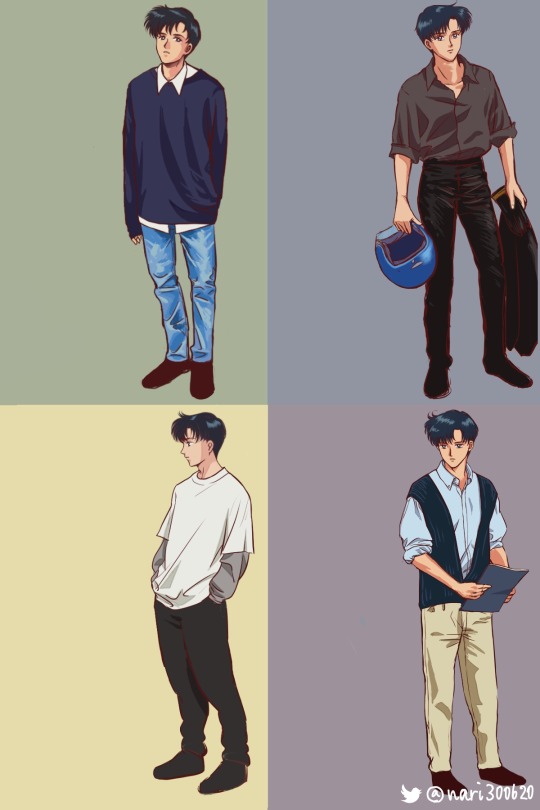
Mamoru in different 90s Outfits
I know people think Mamoru's wardrobe is hideous in the 90s Anime... and I have to agree (for the most part anyway). Did people actually dress like that??? So I did some research... and had some fun along the way! All the outfits are from popular 90s TV shows and Artists.
892 notes
·
View notes
Text
The King’s New Clothes
So I wrote this for @nari20 because it happened, lol! (And the reason it happened is because Nari is currently doing a compilation of Mamoru Makeover Art over on twitter because she is a gift to this world and there is a MANKINI IN IT and TUX UNDERWEAR and I am LIVING and how do we deserve this woman in our midst making our days So Entertaining lol?!)
Anyway. Talking about Mamoru fashion ended in some mutual prompting so. Enjoy some Fabulous Fashionable Kendy tumblr short!
---
Utopia had taken a surprising amount of time to adjust to, and no one had had a harder time with it than the new queen of the world.
Especially in the beginning, she'd bottled it up and painted a smile over it. But Mamoru - King Endymion now, or so his official royal name, and what the fuck that would need some getting used to - had been with his wife for long enough to see the tenseness of her shoulders, know what it meant when she gripped his hand so tight.
She'd been terrified.
The leaders of the world intimidated her. Not because she was someone easily intimidated, but mostly because some of them tried very hard to do so.
She gritted her teeth through glassy eyes when another old, bald man in a bland, navy suit tried to talk down at her, and stood her ground.
But afterwards, she'd tremble in his arms in the hotel room in any capital city of the world and try to breathe in deeply through her nose. When she'd started whipping out notebooks asking him all sorts of vernacular intentionally thrown her way because she could not understand it, thinking she had to learn and asking him to tutor her even though they’d done it all on purpose, he got mad in a way he started shouting for the first time in his life outside of life and death situations.
Not at her, mind you.
But they were trying to bring down his wife, not even realising the luck they fucking had to have someone with her heart trying to make them be compassionate and humanitarian and good. Someone so unwaveringly pure, someone with her unfaltering integrity. Someone so easily finding the good in others and bringing it out.
But they'd just fucking have to learn.
He'd hired a personal translator for her then, first thing in the morning. One of what was to be one of many. Someone who'd take these terms fired at her in foreign languages and usually translated just as haughtily and arrogantly to her, and instead explain them without shrouding them in pomp and circumstance. 'Habituation' in the end, was only 'getting used to something over time', after all, for a good translator.
They might have tried to hit her at her flaws, but Mamoru was determined, at Neo Queen Serenity's side, to show off where she was better than any of these assholes combined. The world lacked love, not fancy words. Usagi had him for the fancy words.
And so, even though it all began in endless work hours that tore at Usagi, in stuffy rooms half-way around the world at any point in the year, slowly, she grew into it. If Usagi was good at one thing, it was finding positivity and joy in all manner of circumstances, and this was no different.
The climate treaty negotiations in Brussels might have been mind-numbingly infuriating, but she'd snuck them out during lunch hour to a Belgian chocolate vendor nearby who'd been making paradise for the tongue for over 300 years in their little family run-store, and Usagi's eyes lit up like this had suddenly turned into the best fucking day. She might have to try and wrangle power-hungry men, but she could also buy a restored French carousel from 1872 and put it in her sitting room, and yes, she had. And yes, she rode it.
But even those worldly pleasures that made it all more bearable for someone who struggled with having to concentrate for a minimum 60 fucking hours a week most of the time, those pleasures that had the power to balance out the fact that Tsukino Usagi did not get to sleep in anymore at all, ever, were sometimes turned sour for her.
The second time he'd shouted outside life-and-death situations, he'd found her crying over a tabloid as she emptied hanger after hanger of extravagant dresses from her wardrobe.
One of those pleasures that made it all worthwhile for her? Fucking extravagant dresses. Even when Usagi was 14 and had only just learned she'd one day be fucking queen of the world, she'd started to look at couture differently. Started collecting moodboards and clippings. She'd been looking forward to that. A teenage girl's dream of the glamourous life of being Queen.
But now that she was, this life was more work than glamour. The only glamour she got was the one she made for herself. Like carousels in sitting rooms. Like Paolo Sebastian Autumn/Winter 2018 and George Chakra Autumn/Winter 2016 and Isabel Sanchis Spring/Summer 2020 and Ralph & Russo 2017 and Dior Spring/Summer 1992.
The tabloid was horrid. 'Neo Queen Serenity: What a Little Girl Looks Like Who Mistakes Leadership for Playing Dress-Up. Is the Future in Good Hands?'
Underneath it, a spread of Usagi in glittering, sparkling, over-the-top dresses. Everywhere from cutting ribbons at the newly minted Crystal Tokyo Center for Free Childcare to sitting in week-long conferences somewhere in New Brunswick.
Sometimes, he wasn't so sure if the world even deserved her.
He'd personally hung back every hanger into this wardrobe himself, cancelled their meetings for the day much to Ami-chan's organisational horrors, and took her shopping in disguise.
That day, something profound had changed.
"This one," Usagi had said with a flushed giggle. Her cheeks were pink, her eyes were dancing. And really, if it took playing dress up for her, no garment was ridiculous enough to not be worth it.
He stepped out the dressing room in the brightest floral-patterned shiny pastel suit the world had ever seen. Baby blue and pink roses over rococo gold embroidery to bright baby blue patent leather loafers. He looked like a chandelier had fallen into fresh paint and then rolled around in confetti. And his Queen loved it.
"Well, then," he'd winked, and she'd giggled again. "Let's take five."
If they were going to make fun of her choice of clothes, he'd just have to top her game, Mamoru decided.
And really, it made so much fucking sense.
Back when he was a boy with a glimpse of he's future, he'd always wondered how the hell THAT happened. And with that, he'd of course meant something quite specific, and not the fact he'd somehow made it on a throne.
A lavender colored tuxedo that had made him frown into the night for a long, long time. A lavender colored tuxedo that had yet not found its way into his possession. One he'd begun to doubt ever would.
Of course, Mamoru had always liked the more dramatic of clothes. So far, so unsurprising. His favorite attire was a tux and cape that he could flap like no other, after all, and then came a color-blocked puff sleave shirt he'd worn until it fell apart. He'd always liked color. One didn't get married to Tsukino Usagi if they didn't adore a colorful world.
But that?
And yet the royal world they'd found in their future hadn't looked satin and lavender when they'd finally made it there. It hadn't happened. It was navy suits and etui dresses with leaded hems to they wouldn't blow up, covered shoulders and skirts that absolutely had to be no smaller than knee-length, and he supposed it had made sense. After all, the Windsors didn't run around in see-through shift dresses and tiaras, either.
He'd even been a little relieved. He liked blending in. He'd told himself, when he first saw that lavender tux when he was fucking 18 and his mind was blown with too much information he should not have had, that he wasn't gonna do it. No matter what.
Now? Now it made so much sense. Really, he should have known. Of course, this was what was gonna do it.
Someone criticize his wife? They gotta go through him.
If protecting his wife's happiness while she made the world a better place meant Lavender Suits and Capes, then this was what it'll take.
Now, he was gonna fucking do it. Of course, he was.
So no, the Windors still wore unicolor, leaded costumes in the future.
His wife wore skin-tight chiffon, silk and satin.
And he wore mermaid-colored sequined-dinner jackets. He wore heels with flamingo-patterned trousers, complete with a tuxedo stripe at each side. He wore shimmering, metallic athletic wear, skin tight. He wore fake fur collars and thick embroidered velvet robes to black leather gloves. He owned a mankini. A hot pink leather jacket he wore over men's pastel evening wear. The green jacket was jealous somewhere in a closet. Maboroshi no fucking fashion sense.
Nobody ever wrote something offending about the Queen's new clothes once he'd grooved himself in.
(Minako loved it perhaps most of all.)
---
(ANYWAY NARI *ILLUSTRATED* THIS IN THE 50 MINUTES THAT IT TOOK ME TO WRITE THIS AND YOU GOTTA SEE HER ART. LIKE WHAT THE FUCK HOW DO YOU DO MAGIC SO FAST, NARI?!)
#my fic#my stuff#tumblr shorts#kendy#maboroshi no fashion sense#crystal tokyo#usagi x mamoru fanfiction#sailor moon fanfiction#i love my friends
84 notes
·
View notes
Text
So Mamoru would own all of these. Every single one. Paired with the ugly green jacket or without. Yes.

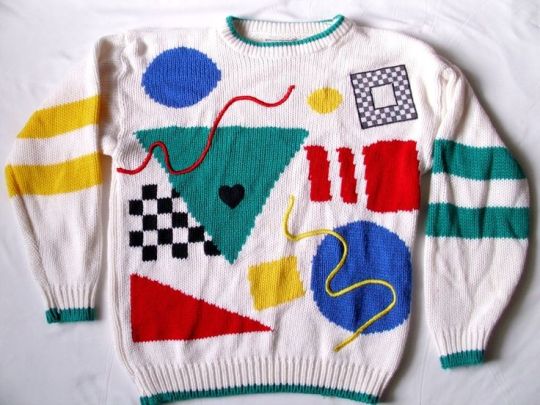
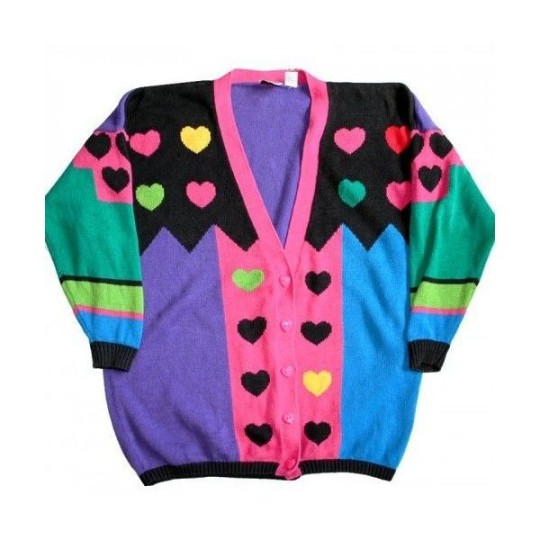

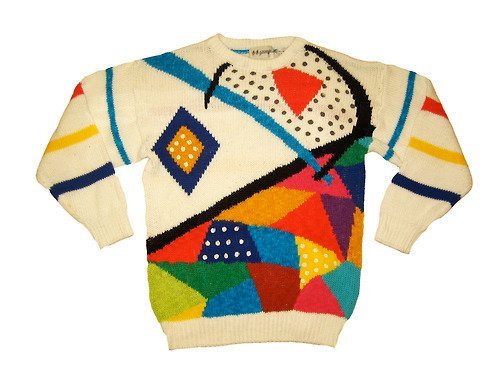
#maboroshi no fashion sense#mamoru chiba#i'm calling it#fanfic inspiration#fanart inspiration#mamoru would own this
32K notes
·
View notes
Photo

ALSO MAMORU WHY. WHY.
WHO ALLOWS YOU TO DRESS YOURSELF?!
#2020 rewatch#maboroshi no fashion sense#Episode 66#mamoru chiba#the curry episode#R#maybe it's secretly a repellent tactic just like the closing-the-door-in-your-face thing?#I better dress in the worse things I find maybe she'll like me less THEN?
37 notes
·
View notes
Text
Samishii Nettaigyo (“Lonely Tropical Fish”)
youtube
“With my heart on the waves, I start swimming, but I can’t catch up to the ideal in your head.”
OR: A lovesick girl with a colorful 80’s sense of fashion waits by the poolside for a guy that doesn’t show.
Stop hoshikuzu de kami wo kazari Non-stop yasashii me wo matsu wa PUURUSAIDO
Stop With my hair decorated with stardust Non-stop I wait for tender eyes by the poolside
ZUKI-ZUKI setsunaku furueru mune maboroshi demo ii aitai no ni
Pain throbs inside my heart, an aching, quivering chest– It doesn’t matter if it’s just an illusion I just want to see you
Heart on wave Heart on wave anata wa konai watashi no omoi wo JOOKU ni shinaide
Heart on wave, heart on wave You don’t come Don’t treat my feelings like a joke
Lonely YURAYURA Swimmin’ YURAYURA Dreamin’ ai ga yureru Stop Stop
Lonely, swaying in the water, swimmin’ Swaying, swaying, dreamin’ My love’s left shaking Stop Stop¹
Love hanagara no mizugi dake ga Love me medachi sugite nakitaku naru no
Love My flower-printed swimsuit is Love me The only one sticking out like a sore thumb, I feel like crying
JIRI-JIRI kogeteru kono itami wo tsumetai mizube ni sotto ukabete
The scorching sun leaves a burning pain that I Gently take afloat into the cold waterside
Heart on wave Heart on wave oyogidasu kedo anata no yume ni wa oitsukenakute
Heart on wave, heart on wave I start swimming, but I can’t catch up to your ideality²
I can’t nee konna ni kurushii no naze naze anata ja na kya DAME na no
I can’t Hey, I’m hurting inside so much Why is it, why is it that nobody but you will do?
Lonely YURAYURA Swimmin’ YURAYURA Dreamin’ ai ga yureru Stop Stop
Lonely, swaying in the water, swimmin’ Swaying, swaying, dreamin’ My love’s left shaking Stop stop
Heart on wave Heart on wave anata wa konai watashi no omoi wo JOOKU ni shinaide
Heart on wave, heart on wave You don’t come Don’t treat my feelings like a joke
Heart on wave Heart on wave oyogidasu kedo anata no yume ni wa oitsukenakute
Heart on wave, heart on wave I start swimming, but I can’t catch up to your ideality
---
¹ Yureru means both swaying (side to side, the way fish “swim” through the water) and shaking, so the same verb is used throughout the stanza.
² The word sung is yume (“dream”), but the kanji used is 理想 (“ideal”).
As a side note: If this song sounds familiar, that’s because it’s been covered by W, MAX, and Kikkawa You and Kaze Hikaru Fukarou.
There’s also two different English covers (with vastly different lyrics): one by the Nolans called Tidal Wave, another by Yoo Yoo called SAMISHII NETTAIGYO.
#Samishii Nettaigyo#Wink#single: Samishii Nettaigyo#lyrics#translation#Lyricist: Oikawa Neko#Composer: Ozeki Masaya#Arrangement: Funayama Motoki#80s aidoru#old school aidoru#aidoru songs referencing animals#release date: 07/05/1989#iconic aidoru songs
9 notes
·
View notes
Text
Samurai Champloo Character Names
I’ve found that many websites, particularly those edited by fans, don’t use the correct definitions for the main characters’ names in Samurai Champloo. I enjoy translating Japanese kanji, so I thought I’d do a little analysis and try to clear up a few misconceptions. I’ll do some character analysis along the way.
I’ll start with Jin, because he’s easy. His name is usually translated correctly. Mugen and Fuu are much more complicated.
Jin (仁)
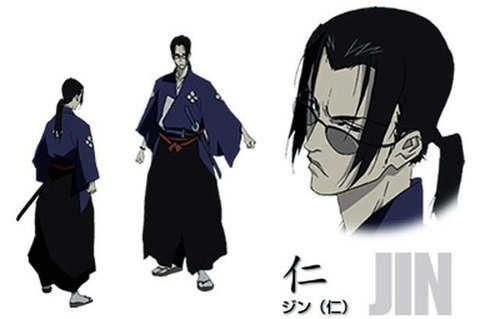
Definition:
Benevolence, compassion, humanity, charity.
Benevolence is one of the virtues of Confucianism, as well as a virtue of Bushido.
Martial arts schools that are influenced by Bushido translate the word in a variety of ways - you might see it defined as any of the words above.
I have this head canon theory that the characters grow into their names over the course of the series. When we first meet Jin, he’s not very compassionate, and he’s not really in touch with his own humanity. I’d say he’s almost as ill-tempered as Mugen, although he’s not nearly as vocal about it as Mugen is. He manages to be polite even when he’s irritated, but he usually comes off as cold and uncaring.
However, as the series progresses, he comes to embody the qualities defined in his name, particularly in his rescue of Shino, and when he starts to become more concerned with Fuu’s well-being. He commits the ultimate act of compassion and humanity when he sacrifices himself to save Fuu. I like to think that Fuu brings out his benevolence, and by the end of the series, his character traits are more aligned with his name.
Incidentally, the four diamonds on Jin’s kimono make up the kamon, or family crest, of the Takeda clan. Because of this, it’s often assumed that Jin's full name is Takeda Jin. (In Japanese, the family name comes first, and the individual’s name comes second.) I’ve written about the Takeda kamon in my glossary of Japanese terms used in my fanfiction. If you’re curious, go here and look for the word “mon,” and you can learn a little bit about Takeda Shingen and fuu-rin-ka-zan.
Mugen (無幻)
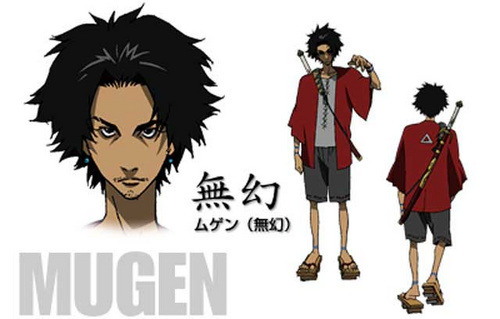
Definition:
No illusions, or not an illusion (i.e., the real thing).
無幻 does not mean infinite, however it is a homophone for a different word spelled 無限, meaning limitless, boundless, or infinite. (Infinite and infinity are not the same word - infinity is 無限大.)
The word mugen is also a homophone for these other words:
Mugen (夢幻): dreams; fantasy; visions
Mugen (無間): incessant; uninterrupted (referring to Mugen Jigoku, the eighth and most severe level of Buddhist hell)
I’ll talk more about the infinite definition in a minute. First, let’s look at the kanji.
Gen (幻) means illusion, and mu (無) is a negator meaning none, nothing, nothingness, not, un- (as a prefix), or non- (as a prefix). (If you’re a Death Note fan, you may recall Ryuk explaining to Light that users of the death note can’t go to heaven or hell when they die. They can only go to mu, nothingness. It’s the same word.)
Just like Mugen’s sword, his fighting style, his clothing, and pretty much everything else about him, 無幻 is a unique name. I’m aware that Mugen is the name of a video game character, an auto manufacturer, and a piece of software(?), however, none of these use the spelling 無幻 or its associated definition. It’s not a common word. I’ve actually never seen 無幻 written in a sentence. Try looking it up - you’ll have a hard time finding it. At best, you’ll find the two kanji separately, but even then, it’ll be hard to find 幻. That’s because the word 幻 is not usually pronounced gen.
Gen is the on’yomi or Chinese reading for 幻. However, as a stand-alone word, 幻 is usually read as maboroshi, using the kun’yomi or Japanese reading. That means you’re more likely to find 幻 in a dictionary if you search for maboroshi instead of gen. Once you find it, you’ll see that it has both pronunciations.
無 is very common - I see it all the time. It’s almost always pronounced using the on’yomi reading mu. The kun’yomi or Japanese reading is -nai which is a negating suffix attached to the informal form of verbs and adjectives. You’ll see it written in hiragana almost exclusively.
Any time you put two kanji together, you can’t mix the on’yomi and kun’yomi readings. It’s has to be one or the other for the whole word. So 幻, pronounced maboroshi by itself, becomes gen when combined with 無 to form mugen.
Given that the word mugen, spelled 無幻, is so uncommon and near impossible to find in a dictionary, I have to assume that the creators of the series made a very deliberate decision when they chose this spelling for Mugen’s name. They could have used 無限, which is much more common, but they didn’t. Because of this, I think it’s necessary that we respect their decision in choosing the spelling of 無幻 with the definition of “not an illusion,” rather than discounting it in favor of 無限 meaning “infinite.”
But that doesn’t mean infinite is irrelevant. It just means that it wasn’t the original intent.
無幻 (not an illusion) is the only kanji spelling given by Manglobe, as shown in the image above. To the best of my knowledge, they have never used the kanji 無限 (infinite). I’ve looked at a hell of a lot of resources, and I’ve never seen it used anywhere except on websites edited by fans who obviously didn’t bother to look up the correct kanji.
What this means is that the definition of infinite did not become canon until episode 18, almost two-thirds of the way into the series. Of course, now it’s baked into the collective fan consciousness as if Mugen’s name always carried this meaning. But originally, it didn’t.
My personal head canon: The fact that Mugen chooses the meaning of infinite, when the original meaning was not an illusion, is a symbol of his character development. He was illiterate up until episode 18, and he had some insecurities about it. When Fuu quizzes him on the character me (”meh”) and he gets it wrong, he’s pretty pissed off. He even blames her for making it a trick question. But then he learns to overcome this obstacle through his own hard work, and he feels a deep sense of accomplishment for having done so. He pushed himself beyond his own limitations and expanded his potential in a way that he’d never done before. Hence the definition of limitless or infinite.
However, I think the original definition still holds true. Mugen is who he is, and he’s very up front and straightforward about that. No frills and nothing inauthentic. He’s the real deal. When it comes to protecting Fuu, he can always be counted on to get shit done. I like to think the same thing was true when he was a pirate. In fact, my theory is that he might have acquired his name during his days of piracy. The word mugen did not originate from Ryukyu, so maybe it was given to him after he left Miyako(?). (Insert your personal head canon here.)
I believe that both definitions of mugen - not an illusion and infinite - can be applied to his character. Not an illusion is the essence of who he is at the beginning of the series, and he grows into the definition of infinite as the series progresses.
That being said, 無幻 is still the only official kanji spelling. If you want to spell “infinite” in reference to Mugen’s name, use the infinity symbol (∞) like Mugen does. I consider that to be canon (as of episode 18) because it’s actually shown on screen and spoken by Mugen. It’s the most accurate.
無限, on the other hand, is not canon. It is never shown on screen or spoken by the characters, and it doesn’t appear in any of the source materials.
Sorry to all those people who tattooed 無限 on themselves or bought t-shirts with it... but I guess you can choose whatever kanji spelling/definition you want. Watanabe-san is notorious for leaving certain details open to interpretation, so if you feel so inclined, go for it.
Fuu (風)

Definition:
Manner, method, style, tendency, demeanor (i.e., a person’s approach or way of doing things, or a person’s outward bearing or way of behaving)
Yeah, that’s right... the word fuu does not directly translate to wind as many fans believe.
If you thought my explanation of Mugen’s name was long and complicated, then buckle your seat belt. I’m going to talk about the definition of fuu, and I’m going to challenge the theory that fuu is short for fuukinchou.
Regarding kanji, I already mentioned the on’yomi or Chinese reading vs. the kun’yomi or Japanese reading. With some kanji characters, the different readings actually have different definitions. One kanji can represent multiple words. 風 is an example of this.
Fuu is the on’yomi reading for 風. The kun’yomi reading is kaze, meaning wind or breeze.
Kaze as a stand-alone word always means wind. Fuu as a stand-alone word usually carries the definition above (when not written in the context of Chinese texts).
However, when 風 is used in a compound to form other words, it can be read as either fuu or kaze. When read as fuu, it may or may not mean wind, depending on context. (Japanese is so context dependent that it can be maddening for a newbie who’s trying to translate straight from a dictionary.)
Here are a couple of examples where fuu means wind in a compound:
Fuusoku (風速): wind speed
Taifuu (台風): typhoon; hurricane
And here are some examples where fuu means manner or style in a compound:
Fuuzoku (風俗): manners; customs
Fuumi (風味): taste; flavor
Fuushi (風刺): satire; irony; sarcasm
Mukashifuu (昔風): old fashioned
Examples are taken from Tangorin online Japanese dictionary
So you can see, it’s not as simple as saying that 風 means wind. The real answer to the question of what does 風 mean is, it depends. Is it being used by itself, or is it part of a different word? Which word? What’s the context? Japanese is tricky like that.
What does all of this mean for Fuu’s character?
Fuu has her own distinct style, and her own way of going about things. Just look at her physical appearance - she is not dressed like a typical young woman of Edo period Japan. Her hair is lightened (my theory, because it looks like a modern hair color for girls who’ve lightened their hair), her hair is in a modern-ish updo instead of a traditional style, he kimono is bright pink - which wasn’t common back then, her obijime is a giant pink bow tied off-center - which is relatively common now, but wasn’t back then, and her fingernails are manicured with flowers painted on them.
Regarding her manner or tendencies - she has a strong personality and she’s willing to go to any lengths to accomplish her goal. She’s a young, unmarried woman traveling with two older, unrelated men, which would have earned her a great deal of disapproval and criticism in Edo period society, but she obviously doesn’t care. She’s tough enough to boss Mugen and Jin around. In one episode, she literally grabs Mugen by the back of his collar and drags him through the street. Who else could get away with that besides Fuu? She also has a natural tendency to want to help other people, which is something that neither Jin nor Mugen, nor many of the side characters possess. She’ll help a complete stranger, even when it might derail her journey. Sara is the best example.
However, despite the fact that fuu doesn’t directly translate to wind, we can’t ignore the running allegory throughout the series of the pinwheels, which are powered by wind - although, the first pinwheel we see is moved by Mugen when he flicks his fingers at it.
The color of the pinwheels is almost always yellow, and in the episodes with Sara, the pinwheels blur into sunflowers when they’re spinning. It might be a way of associating wind with Fuu’s travels to find her father, and maybe Mugen sets the whole thing off by flicking that first pinwheel before he enters the tea house.
Fuu seems to be naturally pulled in the direction of her father, even though she’s unsure which direction that is. So essentially she’s drifting on the wind until she finally gets to Ikitsuki Island. In those episodes with Sara, when Fuu sees the pinwheels spinning into sunflowers, she’s actually in the process of drifting way off course by helping Sara on her journey.
She seems uncomfortable with not knowing where she’s headed, always depending on Mugen and Jin for support and stability, but at the end of the series, she drifts off again towards an unknown future, and she finally seems to be at ease. I don’t know if that piece of her character development indicates that the wind has subsided, or if it just means that she’s content to ride it, wherever it takes her. This is all just my theory, of course. (Insert your own head canon here.)
So, just like Mugen’s name, I think it’s reasonable to say that you could apply a double meaning to Fuu’s name as well, and perhaps she grows into both definitions as the series goes on. She has her own distinct style, and she’s also drifting on the wind to reach her goal.
Now, as for the theory that Fuu is short for Fuukinchou: I call bullshit.
Fuukinchou (フウキンチョウ or 風琴鳥) is a modern word meaning “tanager,” a family of birds. Notice that it has a katakana spelling rather than a hiragana spelling. When katakana is used, it usually indicates that a word represents something foreign. And indeed, the natural habitat of the tanager family of birds is restricted to the Americas, with about 60% of the species native to South America. They do not exist as a native species in Japan, or anywhere else outside the western hemisphere.
So... You know that pretty bird in the series with the red face and breast? The one in Mugen’s memories when he’s dying? The same one that flies away during the end credits of the final episode? Not a tanager. Sorry, guys.
From that fact alone, the idea that Fuu is short for fuukinchou doesn’t make any sense at all.
Need more proof? Let’s look at the kanji.
風琴鳥 is actually made up of two words, not three: fuukin (風琴) and chou (鳥). Fuukin is a musical instrument - an organ or harmonium. Look up 風琴 on Google using the kanji, and look at the images. All organs.
Chou (鳥) is the word for bird. So fuukinchou literally means organ bird, although I think the definition is more figurative than literal. I think organ probably refers to the bird’s song, equating it with a music instrument, but that’s just a guess.
You can break fuukin down further into fuu (風), which in this context means wind (remember, I talked about using the on’yomi or Chinese reading when multiple kanji are put together), and kin (琴), meaning harp or koto. The koto is a Japanese string instrument. The harp is a European string instrument, probably introduced to Japan in the late 19th or 20th century, during or after the Meiji Restoration when western classical music started making its way to Japan.
The Japanese probably assigned a kanji character to the harp by associating it with the closest Japanese instrument. A harp functions a lot like a koto, so let’s give it the same kanji. That’s a common method of assigning kanji characters to ideas or objects for which there is no existing Japanese equivalent.
Thus, when both kanji are taken literally, the translation of fuukin is wind harp or wind koto. Figuratively, it represents the organ. It makes some sense, given that the sounds coming out of pipe organ are controlled by air or wind. Applying this word to describe a family of birds makes some sense too, if you’re talking about the sounds they produce.
So to recap, here’s the breakdown:
風 + 琴 = 風琴 (fuu + kin = fuukin)
風琴 + 鳥 = 風琴鳥 (fuukin + chou = fuukinchou)
What does this mean?
If Fuu was going to be short for anything, it would be fuukin, not fuukinchou. But I’m saying that purely hypothetically, just to play devil’s advocate, because even this is fundamentally wrong - fuu is not short for fuukin.
Just for the sake of argument, if we were to assume that fuukinchou is made up of three words, where the first word is fuu - which it’s not, like I described above, but again, I’m playing devil’s advocate - you simply cannot take a word like 風琴鳥 and decide that the first kanji is an abbreviation. Why? Because 風 is already a word on its own. You’re committing two sins here - you’re dividing fuukinchou incorrectly by breaking it into three words instead of two, and you’re trying to create an abbreviation using an independent word. Fuu is fuu is fuu. It’s not short for another word.
Not only that, but 風 is the first kanji in many other compound words, and it’s not an abbreviation for any of them. Can you imagine it if was? Fuuki, fuudobyou, fuukei, fuudo, fuuchou, fuusoku, fuuja, fuukin ... all of these are words spelled with 風. If 風 was an abbreviation, which one of these words would you be talking about?
Plus there’s the obvious fact that Fuu’s name is spelled 風, not 風琴鳥. Fuukinchou does not appear anywhere in the source materials. Not in the series, not in The Roman Album, not in Battle Cry: The Art of Samurai Champloo, and not in any interview that I’ve read.
Nope. I hate to burst your bubble, but Fuu’s name is not short for fuukinchou.
That’s the end of my spiel. Let me know what you think, and feel free to ask questions if you need clarification or more details. I’m happy to talk about it. I’d also love to hear other theories and ideas.
Thanks for reading!
44 notes
·
View notes
Text
I KNOWWWW I'M SO HYPED
I’M SORRY???
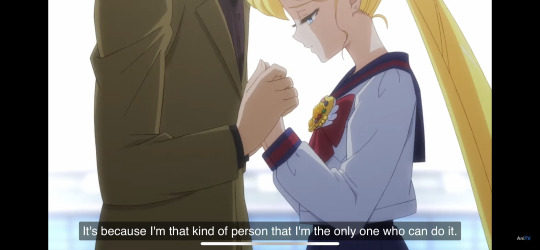
IS THAT THE UGLY GREEN JACKET IN CRYSTAL FORM?!?
651 notes
·
View notes
Photo




Natsumi thinking this is her dream guy because HE DRESSES SO WELL is the most hilarious thing ever, ok? Oh MAN xD
23 notes
·
View notes
Photo
You are a true fandom hero just so you know 🤣 this is SPECTACULAR
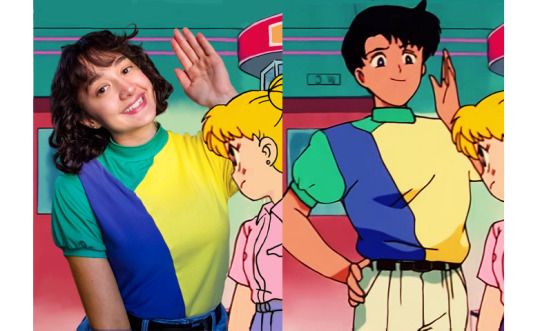
i watched 200 episodes and 3 movies of sailor moon and of all the classic and questionable fashion there was one pastel, color block, mock neck, puff sleeve, sweater/shirt masterpiece that i couldn’t get out of my head.
So i made it
#all these years and I never noticed the PUFF SLEEVES#maboroshi no fashion sense#mamoru chiba#sailor moon cosplay#it kinda counts?#i want this ngl#I WANTS IT
7K notes
·
View notes
Photo

(It ALSO makes for amazing games, so there is that lol.)
#2020 rewatch#fandom love#i love my friends lol#maboroshi no fashion sense#Episode 66#the curry episode
6 notes
·
View notes
Note
I think the green jacket was Ralph Lauren, I did some research and I could only find one or two in that exact colour and cut in collections from the 80s, the other was no big brand, so I'd go with Ralph Lauren. And, if it's actually from the 80s, it could mean Mamoru went to thrift shops, maybe? There was a special in the manga about thrift shops of high fashion items, so Naoko knew them well
Oh god 😂😂😂😂 so you do all think the GREEN JACKET WAS HIGH FASHION?
Oh no 🤣🤣🤣
18 notes
·
View notes
Text
Anon who asked me about my favorite Mamoru outfits: ALL OF THESE!!!!!
What are your favorite Mamoru outfits?
For science, of course. If you have a link or can cite the specific episode/chapter, that would be much appreciated!
2K notes
·
View notes
Photo
OH LOLOLOLOLOL

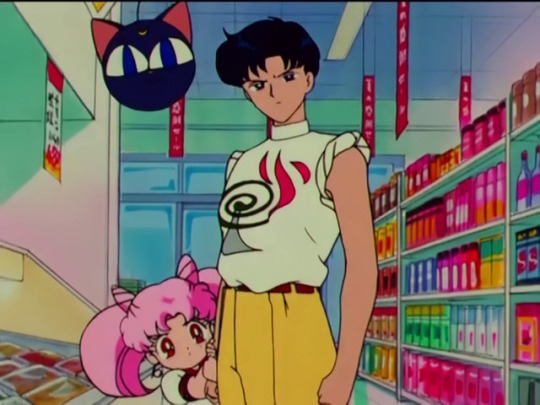

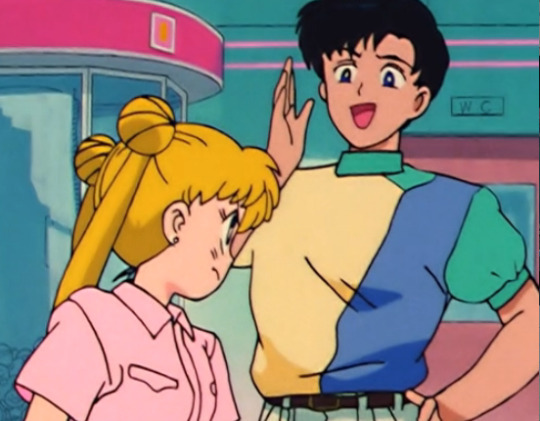
For some reason, Darien chose to interpret this as a challenge.
524 notes
·
View notes
Text
AMAZING AMAZING AMAZING AMAZING AHHHHH!
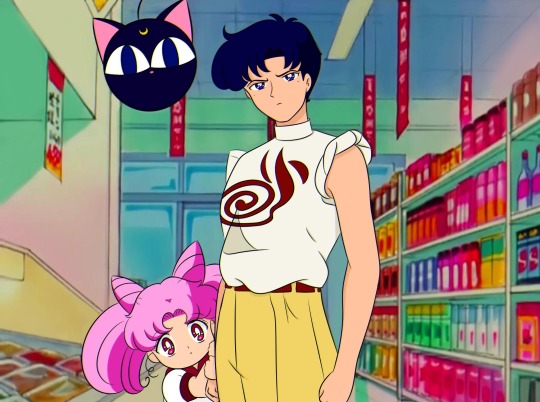
@floraone’s re-watch reminded me how much I love this episode🥺!! (And forgot to post this art😅)
#2020 rewatch#fanart#maboroshi no fashion sense#mamoru chiba#Episode 66#the curry episode#I LOVE THIS AHHHHH XD
59 notes
·
View notes
Note
WaitwaitwaitWAIT
I just looked up that uniform
And excuse me WHAT
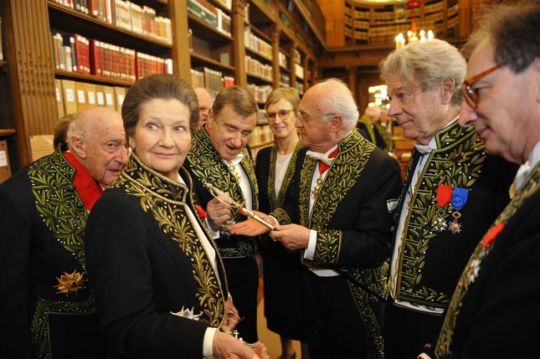
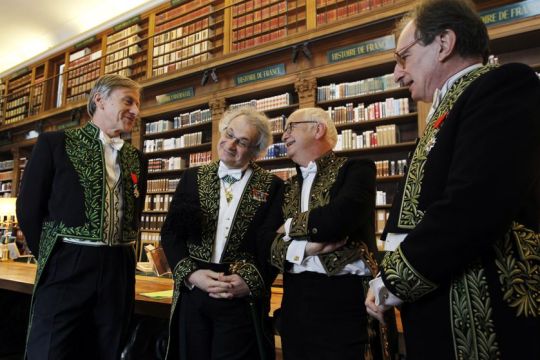
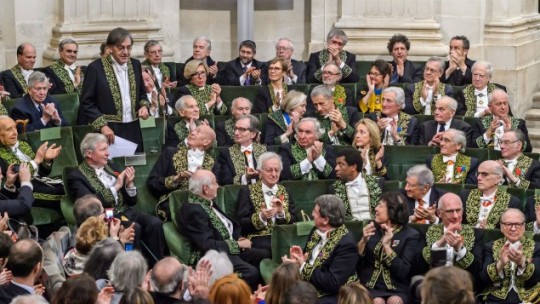
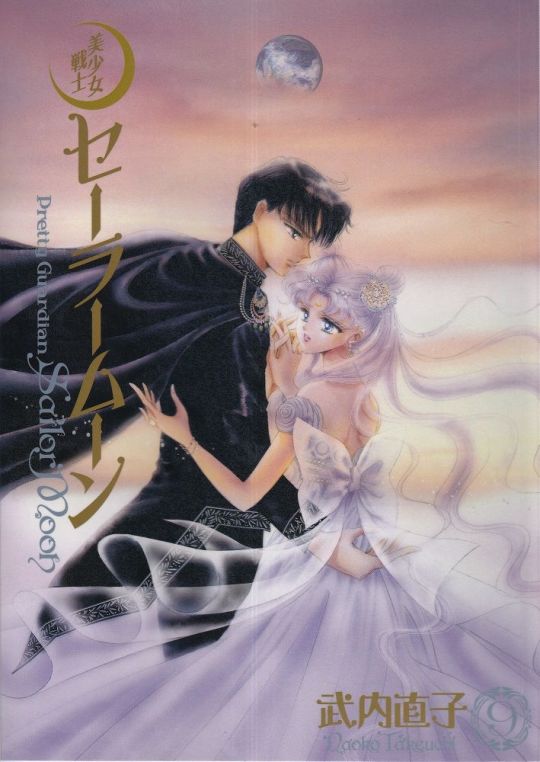
THIS *IS* THE EXACT SAME RIDICULOUSLY GORGEOUS UNIFORM WHAT?
*WHAT*??

I just noticed a thing and I think your tumblr is the right place for this: Mamoru's wedding tux in the artbook is actually the uniform of the members of the Académie Française (and of course it's gorgeous). Now I have this headcanon of Mamoru being somehow accepted in that ridiculously exclusive ancient institution with his acceptance speech written by Nephrite with as many french canadian prophanities as possible (The others somehow manage to purge the worse of them last minute)
you're right, this is absolutely the place for both that observation and idea. i've often squinted at that wedding tux and at least managed to pin it to basically 17th century french formalwear knd of married to the modern formal white-tie dress (which also isn't modern lmao)
but you are correct is is basically EXACTLY THAT except i think his embroidery bling isn't green? it might be but yuck lol
since that institution essentially doesn't get the POINT of language, and im surprised it survived the revolution, and can you believe spoken french numbers holy shit, im not surprised that their uniform is steeped in Pre-Revolution Rich Snob Fashion (which yes is f'ing gorgeous and i want to wear it).
given Neph, and hilariously given the monstersox-inspired headcanon/fanon-subset that neph is absolutely Canadian, EVEN IF Québéc French is almost entirely a Québéc thing, punking l'Académie Française hardcore sounds super plausible, even probable
i KIND OF think, however, that (even if he's selected which is a big somehow) mamoru would be SO TORN because of the contrast between 'ooh omg ridiculous ostensibly-merit-based exclusive distinguished thing yes please this orphan from japan still craves unnecessary public legitimacy' and 'lol vive la révolution fuck you elitist chuckleheads you only want me because i'm popular now'
like he wants to say voregeoisie but knows he's rich uhhhhh
that i think he'd end up getting the uniform AND letting neph write his acceptance speech AND not editing it at all
:D
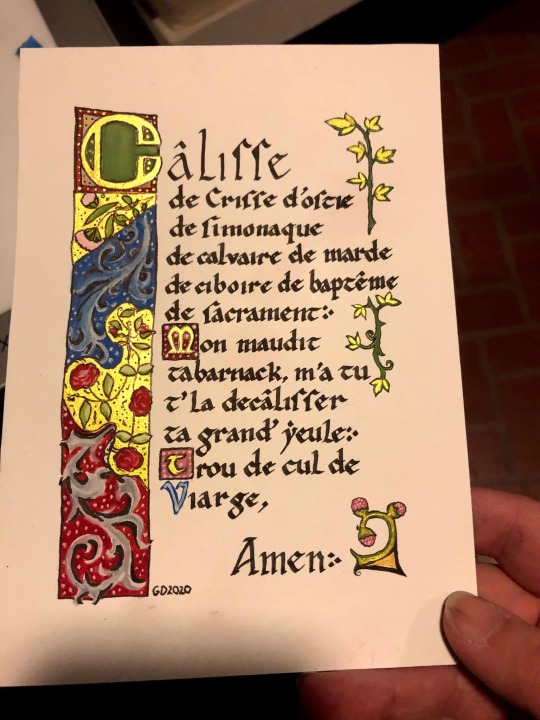
#mamoru chiba#HOW DID WE NOT KNOW THIS?!#sailor moon fashion#maboroshi no fashion sense#sailor moon trivia
121 notes
·
View notes